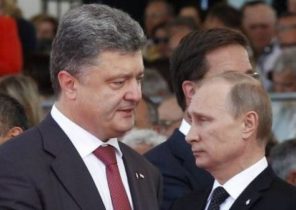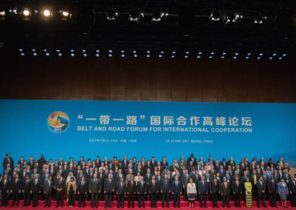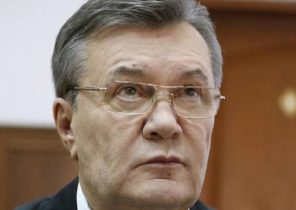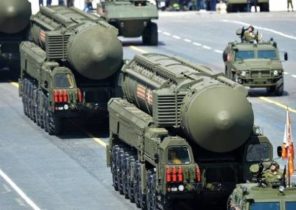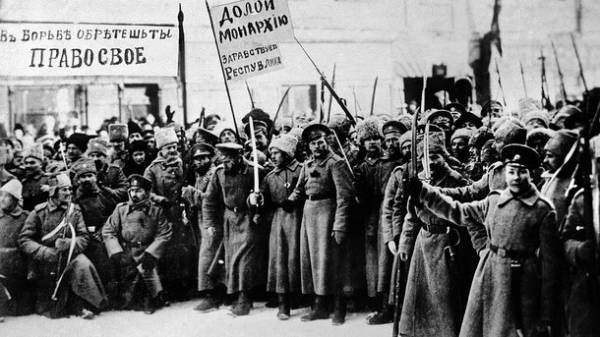
Exactly 100 years ago was one of the most significant events in world history — the death of the Russian Empire. March 15, 1917 Czar, the Russian Emperor Nicholas II, abdicated the throne, and this became the starting signal for the disintegration of the country. Tomorrow we will have the centenary of the Ukrainian Central Rada.
Against this background, it is difficult not to recall another large-scale geopolitical cataclysm, witnessed by living Ukrainians middle and senior years — the collapse of the Soviet Union. At the same time, it’s probably not the last Imperial disaster that we had to observe up close. “Today” figured out why there are empires that allows them to exist for a long time, and also when and why they come to an end.
THE EXPANSION: STRUGGLE FOR RESOURCES AND SECURITY
“The basis of Empire is always the rule (lat. imperare “to command”, “command”), — says doctor of historical Sciences, head of the Department of Ancient history and the Middle ages Kiev natsuniversiteta them. Shevchenko Victor Stavnyuk. Empire created by the conquests of the more powerful center of their neighbors.”
According to Stanica, where born state, always felt a certain lack of basic resources.
“And in the nature of the human community to wage a constant fight for possession, he said. Human history is a continuous series of wars. Very few examples of the coexistence of States, without attempts to conquer foreign resources”.
BENEFIT. In the pursuit of territorial expansion, the state has always been guided by two motives. The first is economic. Capturing new territories and imposing his armed protection, the Governor has an opportunity to use its natural resources and the fruits of the labor of its population. A similar process, in smaller form, many Ukrainians felt in the first half of the 1990s: the formation of the system of “roofs”, in which a powerful criminal gang took businessmen under the protection from criminal “stuff” and other major gangs in exchange for resources.
SECURITY. The second important reason for the expansion is the desire to ensure the security of its borders. Having at hand a potentially dangerous neighbor, there is a temptation to destroy it as a military force and to Annex as an economic resource. So, many of the “barbarian” peoples, subjugated by the Romans, before they themselves have made predatory raids on Rome controlled the territory. As justification for the expansion of Muscovy to the East and the South, too, there has been a need to “protect against Tatar raids”, in a similar way grows in land and China. The Empire had expanded, thanks to victories over other empires. And the confrontation of the giants could go on for ages, until the departure of some of the participants from the historical arena. Punic war, the struggle of Rome with the Parthian Kingdom, the constant conflicts of Moscow from the Grand Duchy of Lithuania, and after the Commonwealth, etc.
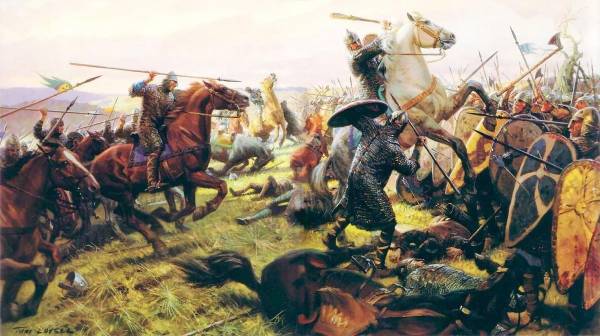
Continuous war. Peaceful coexistence was rare
DISCIPLINE: SWORD AND LANGUAGE
“Obedience may be different, — says Victor Stavnyuk. — Using propaganda to impose the neighboring nation the best system of values. Or to attract the elite. But if nothing comes up, the last argument is war”.
HYBRIDITY. Expansion empires at all times had a “hybrid” character. So, in the Soviet Union and its “socialist camp” cementing the role played by Communist ideology. Delving into the history, we can recall how in remote corners of Europe, inhabited by Gentiles, first, were peace-loving Christian preachers, and after they pay quite a lot of locals, there were soldiers to protect fellow Muslims. Missionary work played an important role in the creation and strengthening of the colonial empires.
The same can be said about the involvement of the elite. Often a significant part of the elite of the Empire adjacent to land already “automatically” configured in its favor. Here, fair trade, and family ties, and cultural influence. And a good example of how smartly live the “best people” of the Empire (which in reality, given the scale of the state, just parasitic on more powerful resources). And when the question arose on the accession to the Empire, could do without serious armed resistance. As was said by Philip II of Macedon, who United under his rule Greece “there is No city wall, which crossed a donkey loaded with gold”.
THE LANGUAGE AND CUSTOMS. “The Romans conquered their space and by force of arms, and the power of its colonies. The sword and the plow” — says Victor Stavnyuk. The part is taken from another people’s lands were taken for the founding of a colony — settlements of the Romans. Thus, the Romans spread first throughout Italy and then the Mediterranean. Colony growing, interconnected roads and become the “skeleton” of the Empire, the center of the romanization of the local population. After a time, the former “barbarians” are already involved in the economic processes of the Empire, have adopted the invaders language and customs and are more feel themselves to be Romans, than the representatives of their native tribe…
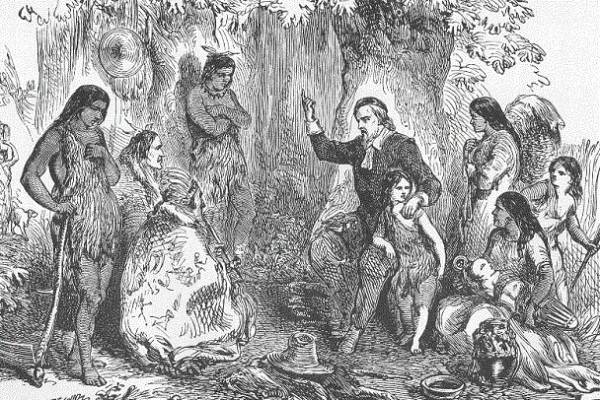
The “hybrid” expansion. First, there was a peace-loving preachers
DROP: ALWAYS FOR MONEY
“The main rule for all empires they fall apart, says Professor of the Kiev national University. Shevchenko, doctor of historical Sciences Vladimir sergiychuk. — Because it created a power and not as an Association of people based on linguistic, cultural, mental, community or common historical memory”.
The only question is when and under what conditions this drop occurs. “The logic of large organizations created as a result of subordination, it follows the principle of correlation of costs, which must be applied constantly to retain the people in obedience, with real positive effect from it, — says Victor Stavnyuk. — At a time when the costs exceed the efficiency, the Empire loses the rationale for the necessity of its existence.”
Empire lives, until the benefits of its existence outweigh the costs.
BENEFITS. The Empire exists as long as the benefits of a significant part of the United under its canopy of people. “Take Roman started as pure violence — is wrong, says Stavnyuk. Roman Empire brought the peoples of the Mediterranean a huge benefit: no internal wars within the boundaries of the law.” It will create new opportunities for economic development — a global open market. These traits are typical of other empires. The Russian, with all its backwardness compared with the advanced countries of Europe, opened the possibility of the active, ambitious and talented representatives of the suburbs. And although “social elevators” under the tsars was working with a loud creak, but the family became one of the most influential in the Empire, a serf youth Taras Shevchenko has become a fashion in the capital of the painter. Terrible from our point of view, the Mongol Empire in its heyday, also gave the conquered peoples security throughout the silk road and one law.
DECAY. But at some point, the shortcomings of the Imperial type of state begin to outweigh its advantages. The power of the Empire — bureaucracy — is becoming a weakness, hindering its development and adaptation to a changing world. It corrodes corruption and relatives in the tops, and the official ideology turns into a farce, which does not even believe the preachers. Outdated laws begin to work against the economy. The province, which yesterday brought the big income, now require a huge cost on their protection and bribery “looking aside” of local elites. And then there’s external factors like the fall in world oil prices. The economy is not able to generate excess product, sufficient to hold the vast territories. “Following the economic problems are national, — says Volodymyr serhiychuk. — Is the awakening of the national memory of the subjugated peoples”. This contributes to the fact that the Empire is in a period of decline may be exacerbated chauvinistic sentiments and the intensification of national oppression.
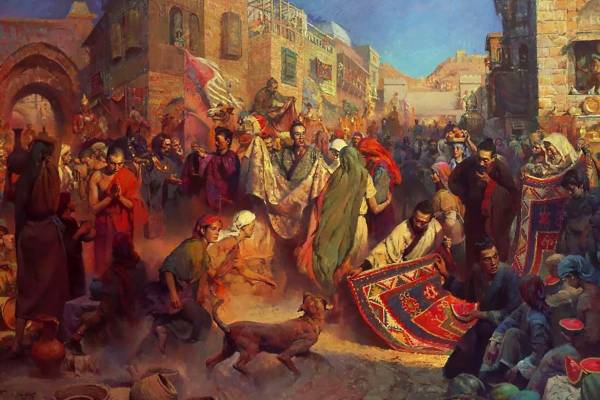
Merchants. Grew rich under the shadow of the Empire thanks to the open market
DECAY: THE CENTRIFUGAL FORCE
In any Empire, there are always political forces seeking its collapse. Here, the dual role played by so-called local elite. In the heyday of the Empire, they often act as the agents of its interests, but in a period of decline can take on the role of its gravediggers.
PROVINCE. “In Kazakhstan last year at the state level, celebrated 150 years of Alikhan Bukeikhanov. He is in the beginning of XX century began to say that this is our desert, and we should live according to its laws. He was the founder of the movement “Alash” and one of the organizers of the Alash Orda (Kazakh public education, destroyed by the Bolsheviks in 1920 — Ed.)”, — says Volodymyr serhiychuk.
Bukeikhanov came from a privileged aristocratic class of the Kazakh Torah, the descendants of Genghis Khan, of whom is traditionally selected Kazakh khans. In 1906 he was arrested as the leader of the Kyrgyz political movement. In 1913 there was a newspaper “Kazakh”, who laid the ideological foundations of the national party “Alash”. That is “independent” of the flow among the elite of Central Asia (and other national elites in Poland, Finland, the Baltic States, etc.) began to appear even before the doom of the Russian Empire became obvious during world war II. And the hardships of war and the associated economic crisis (inefficient economy and Gosport Russia could not stand the military burden) only fueled these processes.
UNDER THE RULE OF THE CLANS. Falling for the first time in the Central Asian Soviet republics 1970s and 1980s from the “European” citizens could not escape the impression that we are not quite in the USSR. Here local authorities were living and acting like beys from books about the “terrible past”.
“In those places has always been tribalism. If this region is leading this clan, and some of it will be the first Secretary of the party. Can change the government, but the clan will rule all the same,” explains Volodymyr serhiychuk.
Soviet laws in practice acted very conditional: for brides still take dowry, if you are poor, buy a flawed wife. Well, or to smoke hashish or opium, and not get married… Drugs, by the way, spoke almost openly, and security forces are fully controlled by the local elite. When the KGB and later General Secretary of the CPSU Central Committee Yuri Andropov tried to restore order on the ground is sent from the center of the investigation group of the KGB was faced with the sabotage and rejection, as evidenced by archival documents.
In some regions of the Caucasus, too, was something to wonder. The Director of the cafe acted like his master, arbitrarily setting the prices, the bus driver — as the current marshrutochniki, etc. Long before the demise of the USSR national margin is actually lived by their own laws, under almost uncontrolled management of local elites, and now these can be seen in its Northern neighbor. The Empire lived until the center was enough power for the elite, feared, and enough money to buy them off. But, sooner or later, over any money.
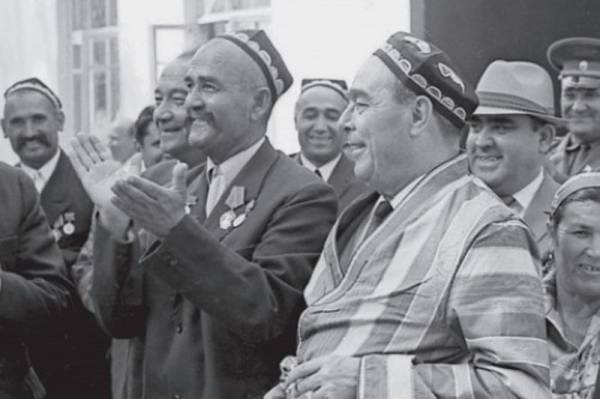
Leonid Brezhnev in Turkmenistan. The loyalty of elites are matched by money
HAD A HAND: “UKRAINIAN TRAIL”
I must say that the instinctive hostility of the Russian Imperials to the “Bandera” has a definite historical basis. After all, the Ukrainians put his hand to the abdication of the king, and the defeat of the putsch, after which soon followed the end of the Soviet Union.
“In the guards regiments had a lot of Ukrainians because they were always conscientious campaigners,” says Volodymyr serhiychuk.
But among stationed in St. Petersburg life guards regiments was one in which the Ukrainians were more than usual — Volynsky: it was considered the most disciplined, reliable, courageous. The Czar imagined that he could completely rely on it. But when the wave of battle passed and Volhynia, the soldiers had changed the desire to protect the king. In addition, it became to assert themselves and the national factor.
“The Royal power for centuries was tied to the capital best Ukrainian minds of the elite, which, in spite of the prohibitions created some of his companies, — said Vladimir sergiychuk. — In 1906 in St. Petersburg, publishes the newspaper “Vilna Ukraina”. In the state Duma there is the Ukrainian faction. In Petrograd branch of the Ukrainian social-democratic party, Committee of the Ukrainian socialist revolutionary party. All this affected, in particular, and to the soldiers.”
Spare a battalion of Volynsky regiment refused to obey orders to shoot at civilians who took to the streets of Petrograd demanding bread and peace, and defected to the “rebels”.
DEMOCRATS. Noted the Ukrainians on the streets of Moscow in 1991 After he spoke geochemisty (19 August), near the Kremlin gathered a group of Democrats who decided that we should go to the White house to defend Yeltsin. One of them is Ukrainian — has brought the yellow and blue ensign. Under him first and walked, then the city Council passed the flag and then went under two flags.
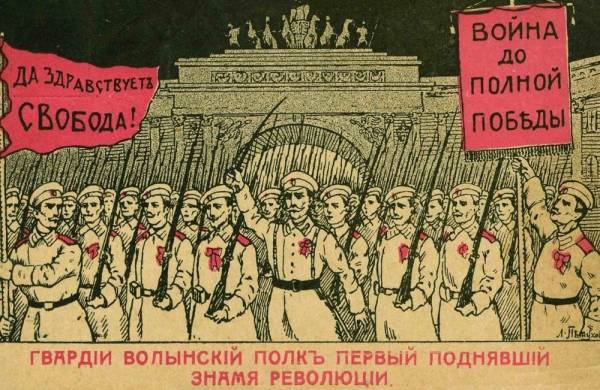
Memory. The Volynsky regiment refused to fire at civilians
